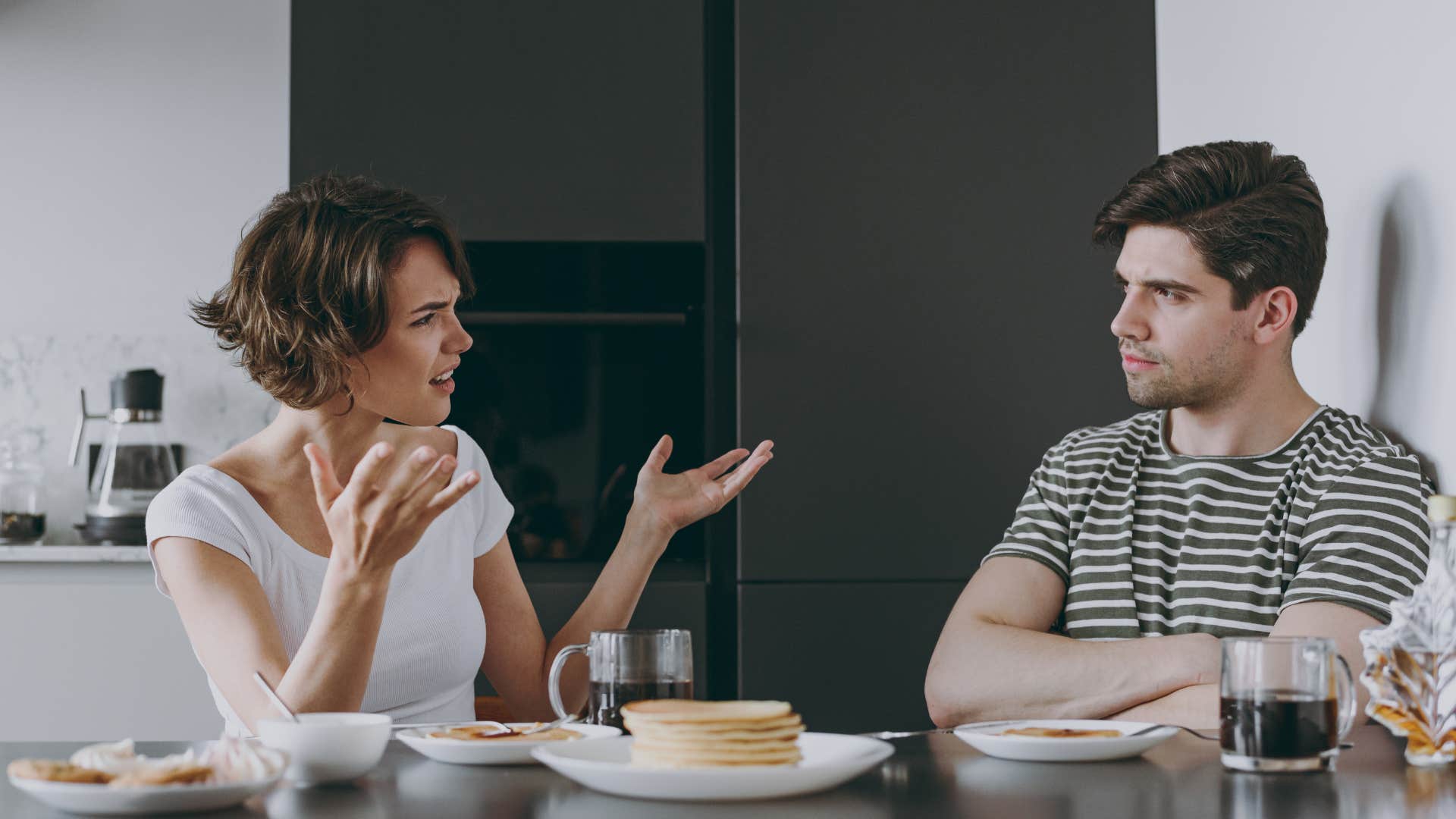COVID Broke America — And You Can’t Convince Me Otherwise
It’s like a dinner gone horribly, horribly wrong.
 LightFieldStudios | Canva
LightFieldStudios | Canva Let me tell you about a dinner I had when I was gearing up to be engaged to my then-boyfriend, Keith*. Keith’s mom always had a very weird, strained, and intrusive relationship with me, to the point where she acted like a jealous girlfriend. As someone who wanted to be married and (then) cared for Keith, I wanted to be on her good side. So, despite a lot of weird remarks from her, I tried to accommodate her demands.
It took effort because she often seemed to find a way to wiggle her way into our date nights or intimate moments. But she also acted like a well-meaning mom. What I’m saying is that we were at the point where I could pretend that nothing weird was going on with her behavior toward me, despite the low-key reality that something was wrong.
That all fell apart when we had a late-night dinner together with Keith. Maude*, as we’ll call her, had a bit too much to drink. And she was kind of slumped over her dinner plate with a smirk on her face. She started to laugh as I poked the vegetables on my plate. “What’s up? Good wine?” I asked. “The food’s great, by the way.”
Keith looked relieved to see us seemingly getting along. She leaned over the table and said, “You know, I heard you with my son. I listened to it all. And I can tell you've been with women too. That’s good for you, sweetie. You should really embrace that side of you. Want more wine?”
Record scratch. My jaw hit the floor.
I turned beet red and couldn’t shut my mouth. I tried to make words — any words — come out. Nothing happened. I couldn’t make a noise out. I looked at Keith. Keith’s face went from relieved to horrified to ghostly white. I didn’t even know how to react, so I got out of my seat, grabbed my overnight bag, and left immediately, with Keith following me, trying to stammer something out. He couldn’t even string together a sentence.
Ever since then, there was no way to ignore the issues that I had with Maude. That was the moment the mask fully fell off. Maude got worse, more controlling, and more intrusive.
We broke up shortly after a massive blowout fight because I called Keith out on trying to pretend that Maude’s behavior was normal. Once I saw what it was, I couldn’t ignore it anymore.
This may be an unrelated story at first glance, but it’s a perfect allegory for COVID’s effects on society.
In life, I’ve noticed that humanity has a weird way of trying to hide the glaring issues we face because it feels easier to just pretend they aren’t there. But, they’re there. We can push those issues under the rug for a minute, until something happens. A bombshell drops. The issue becomes too much to ignore. And then we are all left wondering how we were able to tolerate it, ignore it, and scuttle it for as long as we did.
 ViDI Studio / Shutterstock
ViDI Studio / Shutterstock
That’s precisely what COVID-19’s lockdown did to our society. The lockdown made almost all of us realize how cash-strapped and overworked we all really are. When we were all stuck at home, unable to work, it became abundantly clear how different the “haves” and “have-nots” have it. It was one of the first moments when we realized how unequal we are as a society.
Many of us were stuck trying to figure out how to pay rent when our jobs were furloughed, yet the wealthy were upset because they couldn’t go to Momofuku with their friends. The wealthy stockpiled crazy amounts of food and had parties. The poor struggled to get enough DoorDash orders to pay up. We were given a pocketful of money compared to other countries and told to make do.
The COVID lockdowns also made us realize how overworked we are and how much of our work could be done at home. And it also made us realize offices shouldn’t be a thing. We’ve been wasting our lives on needless commutes.
Once you see it, it’s hard to ignore. COVID also made many people doubt whether they were truly extroverted. The lockdown permanently altered a lot of people’s behavior, perhaps even most. Many former extroverts are now introverts. People who were very heavily cut off from their social outings ended up developing social anxiety.
For a lot of us in that boat, the question began to be whether we actually enjoyed the outings we had. We started to enjoy being homebodies. It was cozy. It was easy. So, were we really actually extroverts, or were we just doing it because we felt we had to be that way? Being stuck at home made us question who we are.
I find it much easier to stay at home, watching content, than I do to try to talk to other people. I started to wonder if it’s just me or if others were feeling the same way. Others had the COVID isolation hit them right in the self-esteem.
For others, such as myself, we started to realize we felt less lonely when we were at home alone. I used to go out to try to connect with other people. After being stuck at home, I lost my interest in trying to connect with them.
I realized I felt less alone at home. So I stopped going to parties. And I started feeling worse, wondering if anyone even liked me. A large part of me generally doesn’t feel cared about, and it’s been affecting my mental health. I eventually realized that the scene I was in was just toxic to me, and that it wasn’t my fault. I was a good friend. It just wasn’t really returned and that’s why I felt so lonely. I’m still not okay, but I’m at least more real about it.
Isolation also caused some to go off the deep end, forcing us all to reckon with how much of a radicalization problem we had.
As a long-time member of the QAnonCasualties community, I noticed a lot of people who lost their family members to Q got radicalized into the insanity during the COVID lockdown. That’s purely due to the isolation that occurred during the lockdown. This is because the people who got radicalized didn’t take to the loneliness well. They started to doomscroll. They started to feel angry, out of control, and powerless. And that’s often what got them swept up into the Q conspiracy as a result.
I’ve written about this before, but the hard right purposefully targets loners, people with low self-worth, vulnerable people, and people who feel like they lack an identity. For many, many of us, the pandemic exacerbated the very factors that extremism tends to (temporarily) assuage. Q makes a lot of people feel like they are privy to serious, exclusive information. It allows people to feel like warriors and to choose a reality that isn’t real, which actually can be an escape for them.
Perhaps the most insidious thing about Q-Anon is how it came at a time when many people felt angry, outcast, and slighted. That only fueled the fire more. Q gives them the ability to channel anger and feel like they’re the good guys.
So, seemingly overnight, people witnessed their loved ones and friends become obsessed with conspiracy theories. Some folks also noticed something else — a link between COVID and the madness of Q.
So, let’s talk about the major elephant in the room: the actual disease itself.
As many people on QAnonCasualties noted, there seems to be a psychological aspect to COVID-19 that we aren’t really discussing as a whole. While much of the craziness could be linked to the isolation people felt, the National Institute of Mental Health (NIMH) noted that there does seem to be a trend of developing mental illnesses as a result of the sickness.
I don’t need to tell you that mental illness has a crippling effect on one’s social skills. For many people, COVID effectively was the swan song to their social lives, for more than just isolation’s sake. In a sane society, our government would be proactive about nipping COVID-related mental illness in the bud. It would also require us to get vaccines to stop the spread and offer free counseling or medication to those affected.
Unfortunately, this is the USA, and that means people don’t matter. Our government has not done anything to really abate the growing mental health crisis on a number of major factors, aside from some gaslighting and victim-blaming. Now that we’re starting to watch society fall apart at the seams, it’s becoming very clear how unhealthy we are as a people. What’s worse is that most of us feel totally helpless to make a change.
Among kids, the COVID lockdown had other major issues.
The pandemic basically destroyed an entire generation’s childhood. It wasn’t even the scariness of it that wrecked them. It was the isolation. Teachers everywhere are talking about the problematic behavior they’ve seen after the pandemic.
Much of the decline seems to be linked with another major issue: phones. For Q-Anoners, phones are their tool to get the “high” they enjoy from radicalizing conspiracy theories. For kids, their phones are the gateway to the content and lives they prefer to live.
As a parent, I’ve heard my kid complain that some of her classmates “just don’t care” about anything that goes on in school. As a friend of teachers, I hear about the apathy, the violent outbursts, and the impossible-to-teach circumstances they face. The kids are not okay.
As a teacher friend of mine said, “They’ve always been glued to their phones, but now, it’s as if they were glued to their phones and dead inside.” Some time around the pandemic, the isolation seemed to get to them, and their phones became their lifelines to a world of glittery TikToks and music videos. Take the phone away, and some of them get downright scary.
We used to be able to ignore the chaos, pressure, and abuse that schools put on teachers. Post-pandemic, it’s become all too clear that they’ve been dealing with far, far too much…and that the kids aren’t alright.
The pandemic shed a serious, stark light on the problems we as a society kept trying to brush under the rug.
I sometimes miss the naivete we used to be able to have before the pandemic. The way that we could just deal with “business as usual” was comforting because we still had some kind of hope in human interactions. The pandemic forced all of us to take a look at how much our day-to-day interactions have crumbled. It’s also forcing things to accelerate to the point where we can’t ignore the problems because they’re growing at a breakneck speed.
We can’t go back to normal. Some of us are deeply altered, permanently so.
And yet, so many of us are still trying to pretend it can go back to normal. We keep trying, and it keeps failing. Normal is gone.
So, what can we do now? Hm. Guess we might have to confront our shadow sides and fix things before it gets worse.
Ossiana Tepfenhart is a writer whose work has been featured in Yahoo, BRIDES, Your Daily Dish, Newtheory Magazine, and others.

